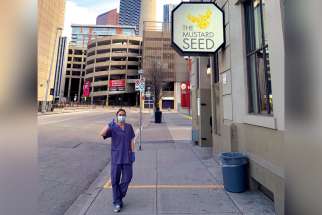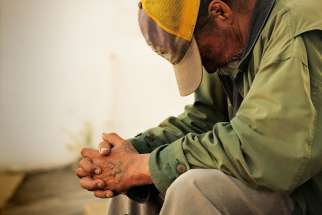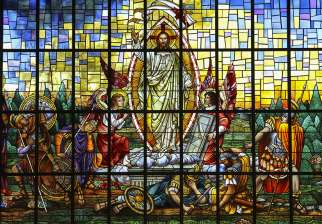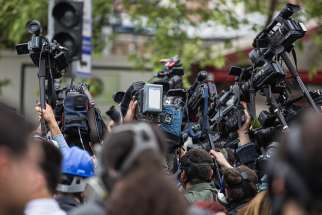Despite plenty of reasons to believe otherwise, Christianity remains the greatest force in the global push for human equality, human rights and the dignity of the human person.
Medical student comes to aid of homeless
CALGARY -- When the University of Alberta in Edmonton ceased campus activities in response to COVID-19, Virginia Goetz immediately looked around for an opportunity to aid Albertans most vulnerable to the pandemic.
‘New normal’ means new tasks to tackle
CALGARY -- A few weeks ago, Jamie Hunka sat at a desk in one of The Mustard Seed’s support centres helping job seekers write resumes and master interviewing skills.
For fans of the Edmonton Oilers, like myself, the Stanley Cup playoffs are a time of mourning. Our team has only made it to the playoffs once in the last 13 years. Well, we can cheer for another Canadian team, but this season all three which made the playoffs — Winnipeg Jets, Calgary Flames and Toronto Maple Leafs — lost their first-round series.
Glen Argan: Faith requires an encounter with Christ
Belief in the bodily resurrection from the dead of the crucified Christ is the core of Christian faith. St. Paul stated the point succinctly: “If Christ had not been raised, your faith is futile and you are still in your sins” (1 Corinthians 15:17).
Indeed, the importance of the Resurrection goes further than that. The empty tomb reveals that the Resurrection is not a testimony to the immortality of the soul or to a “spiritual” rising in which Christ’s spirit lives in His followers while His body decays in the ground. As well, the rational grounds for belief in the Resurrection are evidence that faith is not blind or irrational.
“Was this story about love, money, conquest or disaster?” That was the question Gordon Sinclair asked week after week on CBC-TV’s long-running Front Page Challenge. If a news story did not have at least one of those four elements, Sinclair surmised, it might be a story, but it wasn’t news.
Glen Argan: Nicodemus represents hope for humanity
Nicodemus is the organization man who realizes his organization does not have the answers. So, he looks further afield. You are not supposed to do that, but he does it anyway. His heart hungers for more than arid policies, and what do you know, but he finds that something more.
The Mustard Seed: Graduation ends a journey of pure joy
Refugee groups want bishops to grill Kenney
TORONTO - When Immigration Minister Jason Kenney walks into a room full of bishops in St. Adéle, Que., Catholic refugee agencies are hoping the minister gets an earful.
Five Catholic immigration and refugee organizations in Toronto have written to the bishops asking that they challenge the minister on changes to Canada’s refugee and immigration laws. Kenney will address the bishops between Sept. 24 and 28 in a private, off-the-record session at the Canadian Conference of Catholic Bishops’ annual plenary meeting.
Romero House, Sanctuary Ministries of Toronto, FCJ Refugee Centre, The Mustard Seed and Becoming Neighbours want the bishops to ask Kenney:
o Why Canada is treating refugees from some countries differently than refugees from other countries?
o Whether it’s fair to rush certain cases through the system before refugees hire a lawyer and prepare a thorough case?
o Why the government is limiting basic health care for refugees?
o Why do so many of Canada’s 200,000 foreign workers have no stable pathway to permanent resident status?
o Why are refugees smuggled into Canada as a group blocked for five years from re-uniting with their families even if they are found to be legitimate refugees?
The CCCB won’t say whether these questions will be asked, but it has the potential to re-open an old feud between the bishops and Kenney. In November 2010 the bishops’ Justice and Peace Commission wrote to Kenney to complain of sections of “The Balanced Refugee Reform Act and the Maritime Transportation Security Act.”
“Many of the clauses of this legislation may contravene international law and Canadian law, and penalize refugees more than the smugglers,” said the CCCB letter, adding that his anti-smuggling bill “risks creating serious obstacles to sponsorship and family reunification.”
Kenney did not welcome the bishops’ criticism, telling Canadian Catholic News Ottawa correspondent Deborah Gyapong the letter reflected a “long tradition of ideological bureaucrats who work for the bishops’ conference producing political letters signed by pastors who may not have specialized knowledge in certain areas of policy.”
Romero House director Sarah Villiger hopes this approach to Kenney through the bishops will draw a warmer response.
“We knew that (Kenney) would be there, personally invited. I think that in itself is a bit of a different tone, as opposed to just writing him a letter,” she said.
In part, the refugee agencies wanted to remind the bishops of their own stand on refugee and immigration issues. The letter quotes the bishops own 2006 pastoral letter “We Are Aliens and Transients Before the Lord, Our God.”
“Openness should be shown to persons of all cultures and origins, no matter their immigration status. Christians are to be among those who refuse to let injustice toward migrants continue, let alone increase,” the bishops wrote.
“We thought it was important that they get the input of people who work on the ground with refugees,” said Villiger.
The organizations also took the opportunity to remind the bishops of the many refugees and immigrants who actually occupy pews on Sunday morning.
“The Canadian Catholic Church has historically been an immigrant Church, and today many of the Catholic faithful are immigrants and refugees who form a vital part of and make a significant contribution to the Church in Canada,” they wrote.











